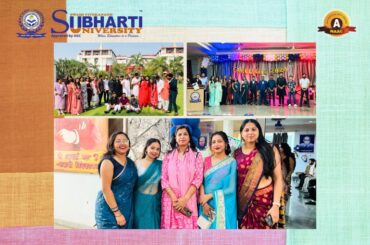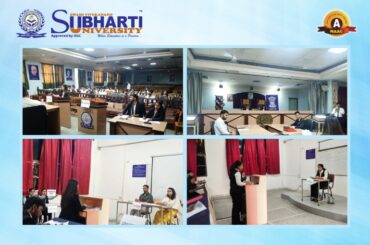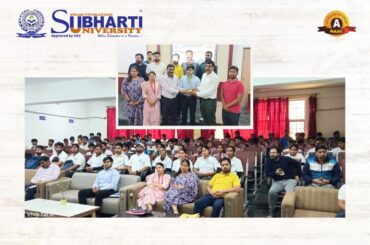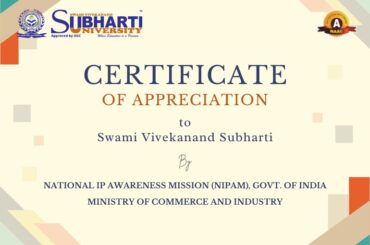COMMUNITY SENSITIZATION AND TRAINING PROGRAM
In continuation of ‘Azadi ka Amrut Mahotsav’ and to save the farmers rights through G-20 summit a sensitization programme on Protection of Plants Varieties and Farmers Rights Act and to spread the awareness among the farmers, about their rights, and protection of high quality seeds/ foundation seeds of crops, was organized by Sardar Patel Subharti Institute of Law in collaboration of Protection of Plants Varieties and Farmers Rights Authority, Government of India, New Delhi, under the guidance of Prof (Dr.) Vaibhav Goel Bhartiya, Dean, Faculty of Law, Swami Vivekanand Subharti University, Meerut.
Ms. Ana Sisodia, anchor of the programme called the distinguished guest for dias formation and lamp lightening in front of the Goddess Saraswati. In continuation of the programme the host for the day, Prof (Dr) Vaibhav Goel Bhartiya, welcomed the guest speaker Prof (Dr) Mahaveer Singh, Dean, Faculty of Science, Swami Vivekanand Subharti University, Meerut along with the audience of the day i.e. the ‘Annadata’ (farmers) of the country, and Dr Amit Kumar welcomed the Dr C.P. Singh, agriculture expert, by presenting the plants.
Dr. Joginder Singh, the first speaker of the day, told about the Role and Adverse Effects of using High Yielding Varieties of Seeds. He said that healthy and good quality seeds are the roots of a healthy crop. The seeds that are used to cultivate new crops have to be selected very carefully and of high quality. The good quality seeds can either be bought from different sources or farmers can produce by their own. The selection of seeds is used to improve the quality of yields. There are several diseases that are transmitted via the seeds. If the selected seeds are from the infected fields then the seed-borne diseases will cause severe problems in the agricultural process. Thus, always obtain seeds from healthy plants. Along with the disease free and healthy seeds, farmers also need to check the germination period of the seeds, nutrients required and
other benefits in terms of yield and finance. Further, overall, selecting good quality seeds are essential for growing strong and healthy crops. Further he told that the Seed Act,1966 includes the provisions of various types of seeds as seed of food crops including edible oil seeds and seeds of fruits & vegetables, Cotton seeds, Seeds of cattle fodder, Jute seeds, Seedlings, tubers, bulbs, rhizomes, roots, cuttings, all types of grafts and other vegetative propagated material for food crops (or) cattle fodder. Good quality seeds were also provided to the farmers by Swami Vivekanand Subharti University.
Mr. Popin, second speaker of the programme, informed the farmers about the various varieties of mushrooms and said that by the farming of mushrooms farmers can earn a lot. Further he said that till the day more than 2000 varieties of mushrooms are available out of these only 7-8 types can be consumed by human beings. Out of these 7-8 varieties one is known as ‘Milky Mushroom’ or we can say ‘Button Mushroom’. He further aware the audience about the nutritional values of mushrooms because it is one of the good sources of protein.
Dr. Amit Kumar (Department of Agriculture, Subharti University) said that India is one of the 17 countries with great biodiversity in the world. Apart from this, 22 types of biodiversity centers have been established in India. He told the farmers that the biodiversity of the areas around river Ganga is found to be different from the biodiversity of areas around river Narmada.
Similarly, the Deccan region of India, irrigated by the Krishna and Kaveri rivers, has a different biodiversity from the Brahmaputra river basin region. While you are going to cultivate you have to understand the nature of the soil of your area. If the soil quality is good then you will be able to get a good result as the bumper growth of the crop sowed by you.
Guest speaker of the day Dr C.P. Singh spoke on the ‘Impact of pesticides use in agriculture: their benefits and hazards’. He talked about how the pesticides used by the farmers to get the huge amount of crops in competition with neighborhood farmers are affecting human health? Pesticide covers a wide range of compounds including insecticides, fungicides, herbicides, rodenticides, molluscicides, nematicides, plant growth regulators and others. A pesticide must be lethal to the targeted pests, but not to non-target species, including man. The pattern of pesticide usage in India is different from that for the world in general. As in India 76% of the pesticide used is insecticide. The main use of pesticides in India is for cotton crops (45%), followed by paddy and wheat. The use of pesticides includes enhanced economic potential in terms of increased production of food and fiber, and amelioration of vector-borne diseases, then their debits have resulted in serious health implications to man and his environment.
Prof (Dr) Mahaveer Singh, Dean & Principal of Keral Verma Subharti College of Sciences, said that in the 21st century we have changed the methods and techniques of agriculture. In ancient times we were using compost (made by cow-dung) or worm compost to increase the quantity of crops. But in the present farmers are using various types of chemical based fertilizers, which leaves an adverse effect not only on the human health and plants and animals but leaving an impact on flora and fauna too. If the ancient methods of farming will be adopted by the farmers with the help of new technologies definitely they will be benefitted. Further he told the farmers that it is required to get the bumper crops you have to grow and secure the qualitative seeds and also check the quality of the soil of your farms/fields. If something like minerals are missing or their components are less than required, then only that particular mineral must be added by the farmers. Further he offered the farmers, if they are willing to check the quality of soil of their farms, they can come to the Subharti Science College for the quality check-up of soil.
Prof (Dr) Vaibhav Goel Bhartiya, said that the Protection of Plants Varieties and Farmers Rights Authority has been set up by the Government of India by virtue of the Protection of Plants Varieties and Farmers Rights Act 2001. In order to provide the information to the farmers, for the establishment of an effective system for protection of plant varieties, the rights of farmers and plant breeders and to encourage the development of new varieties of plants it has been considered necessary to recognize and protect the rights of the farmers in respect of their contribution made at any time in conserving, improving and making available plant genetic resources for the development of the new plant varieties and to accelerate agricultural development this programme was organized. Such protection is likely to facilitate the growth of the seed industry which will ensure the availability of high quality seeds and planting material to the farmers. India having ratified the Agreement on Trade Related Aspects of the Intellectual Property Rights has to make provision for giving effect to the Agreement. To give effect to the aforesaid objectives the Protection of Plant Varieties and Farmers’ Rights Act, 2001 has been enacted in India. For the purposes of this Act, Protection of Plant Varieties and Farmers’ Rights Authority has been established and is located at: NASC Complex, DPS Marg, Opp- Todapur, New Delhi-110 012.Further he told the audiences about that this Act is not just incongruous with International Union for the Protection of New Varieties of Plants (UPOV), 1978, but it also has adequate arrangements for securing the interests of open division reproducing foundations and the farmers. The Authority takes account of the commitments of both farmers and breeders in plant breeding and also provides for the implementation of TRIPs, which underpin the particular financial interests of many partners including private, open and review organizations, and of farmers obliged to acquire property. Moreover, he said The Protection of Plant Varieties and Farmers’ Rights Act, India presented a section on Farmers’ Rights, which has three legs
- Farmers are perceived as plant raisers and they can enlist their assortments;
- Farmers occupied with the protection of hereditary assets of landraces and wild family members of financial plants and their improvement through choice and safeguarding are perceived and remunerated; and
- Ensuring the customary acts of the farmers of sparing seeds from one gathering and utilizing the spared seeds either for planting for their next reap or offering them to their homestead neighbors.
He said that the authority also gave Rs. 10,000,00/ as community award to the farmers but it is very sad that the farmers are not aware how and where they can submit their application for community award. He told Registration of new plant assortments, basically inferred assortments (EDV), surviving assortments; Developing DUS (Distinctiveness, Uniformity, and Stability) test rules for new plant species; Developing portrayal and documentation of assortments enlisted; Compulsory listing offices for all assortment of plants; Documentation, ordering, and listing of farmers’ assortments; Recognizing and remunerating farmers, network of farmers, especially inborn and provincial network occupied with protection and improvement; Preservation of plant hereditary assets of financial plants and their wild family members; Maintenance of the national register of plant varieties; and Maintenance of the National Gene Bank are the functions of the Protection of Plants Varieties and Farmers Rights Authority.
By underlining the role of farmers he said that in the conservation and continuous development of local plant varieties, said that if you develop any seed or plant at the local level and get it from the above authority when you get legal recognition, then the varieties developed by you are protected from multinational seed companies only by the authority. He said that then the right to exchange the crop or seed developed by you will be yours. A question and answer program was also organized in this workshop. About 135 farmers participated in this workshop. Farmer Pawan asked how we can get our paddy seeds registered. Another farmer Dharmendra asked whether the seeds of the fruits of the old trees that our grandfather planted on the farm can also be registered. In this way, farmers Dharamveer, Ashu, Pankaj, Kamal etc. also raised their questions, which were resolved by the experts. During this sensitization programme a booklet in understandable language, contains the information about the farmer’s rights. Researcher’s rights, breeder’ rights and rights of new species developers, how they can apply for community award, process of selection of village for community award, procedure for selection of farmer’s for award, processing of application etc. were also given to the audiences.







